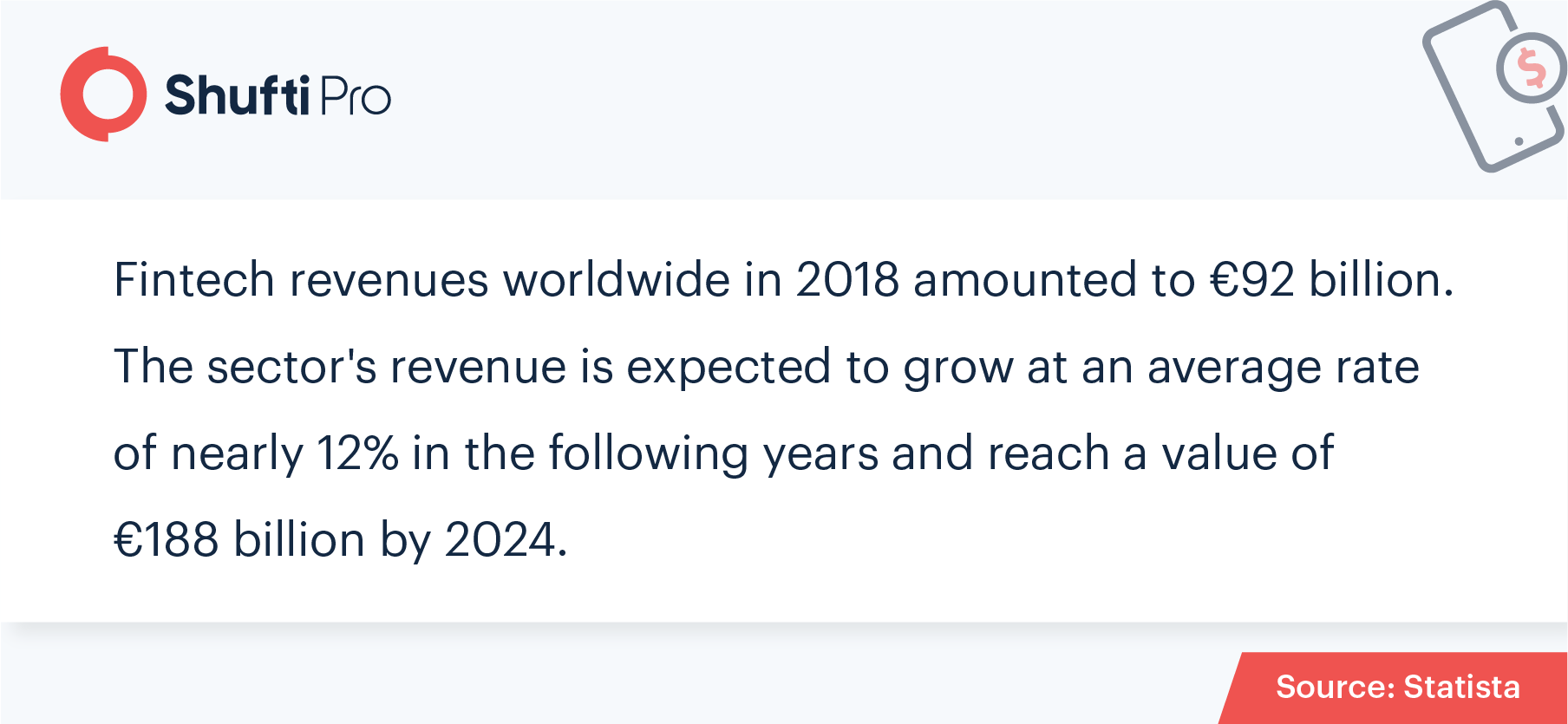Establishing a KYC/AML Compliance Regime for the FinTech Sector

Today, more than 60% of the financial institutions in the market consider Fintech startups to be trusted partners. Fintech services are obliged to comply with Know Your Customer (KYC) requirements, which are needed for any business organization to meet its Anti-Money Laundering (AML) regulations. Financial institutions have been hit with global sanctions and penalties of up to $10.4 billion for AML failures, non-compliance with KYC regulations, data privacy issues, and Markets in Financial Instruments Directive (MiFID) regulations in 2020.
Digital banking, NFC payment, virtual assets, and crypto coins are examples of FinTech development that have assisted the financial sector on the road to digitization. FinTech, like traditional banks, is subject to KYC/AML regulations. Therefore, organizations should not be concerned with making money and make efforts to accurately identify who they’re doing business with, which requires validating clients’ identities and adhering to KYC and AML compliance.

Building an Effective KYC/AML Regime for the FinTech Sector
The Fintech business was unregulated in many places a few years ago, which made it prone to criminal activities. However, SaaS providers have now developed technology-driven solutions to combat the challenges faced by the diverse Fintech sector that influences numerous other industries. Hence, compliance professionals have modified current KYC and AML legislation to aid Fintech companies in a better way.
Following is the breakdown of the essential procedures that constitute the basis of compliance for the Fintech sector:
Customer Identification: As cases of financial fraud and other adverse criminal activities are surging, the Fintech businesses have to develop a customer identification framework undergoing KYC checks to verify the real identities of the customers before getting them on board.
Transaction Monitoring: To fulfill the Know Your Transaction (KYT) compliance, businesses must monitor the customers’ transactional activities in order to detect unusual patterns. This will help them out to prevent money laundering and terrorist financing. However, when suspicious activity is detected, the firm is obliged to report instantly to FINTRAC as per Bank of Secrecy Act (BSA) requirements.
Politically Exposed Persons (PEPs) Screening: Firms have to thoroughly screen the customers that have a record of involvement in criminal activities or are listed in global financial watchlists. It is especially true for PEPs that may possess the significant risk of money laundering to Fintech businesses. Therefore, keeping the uncertain situations in mind, ongoing screening of high-risk entities should be carried out.
Customer Due Diligence (CDD): This is an essential part of the KYC process as it entails validating a customer’s identity based on the information obtained from a trustworthy source. Therefore, Fintech companies must conduct CDD before allowing customers to make transactions.
Enhanced Due Diligence (EDD): In the case of high-risk entities, Fintech firms are liable to perform EDD to prevent the risks of money laundering and terrorist financing. Moreover, AML compliance professionals need to gather information to run EDD checks on politically exposed persons.
Adverse Media Monitoring: Today, it’s quite easy for companies to determine the credibility of their customers by stalking them on social media platforms. Adverse news stories usually indicate that the clients’ may be involved in suspicious activities or in serious financial crimes like money laundering. Thus, Fintech must monitor for adverse media on traditional screens and print media from authentic digital sources.
AML Department: Fintech companies are required to make a separate department for screening money laundering activities. To do so, firms need to onboard AML compliance officers (AMLO). These professionals are responsible for continuous AML monitoring and forwarding the case to regulatory bodies like FinCen if any suspicious activity is detected.
Employee Training Program: Employees must be trained on how to detect and prevent financial crimes. This can be accomplished by organizing training programs, walkthrough briefings, and peer-to-peer meetings in order to provide information regarding evolving anti-money laundering requirements.
Maintaining Records: Businesses have to document customer records in an effective manner. Such records include detailed customers’ information and risk assessment reports in order to present them to the regulatory bodies if necessary. Enterprises are required to keep these records for at least five years.
Suspicious Activity Reporting (SAR): The procedure for reporting suspicious activity to the regulatory bodies includes the employee that will mention the money laundering activities to the AML officer who will subsequently take the matter into the regulator’s knowledge. Thereafter, AMLO is required to submit suspicious activity reports to senior management, such as the number of suspicious transactions and money laundering schemes found during the reporting period.
Aftermath of Non-compliance Over Fintech Industry
Technological advancements have made cybercriminals opt for more sophisticated ways to exploit financial security systems easily. To counter the tactics of imposters and the prevailing financial crisis, regulators put in place KYC AML measures to protect Fintech and its customers.
FinTech, like any other financial industry, is subject to crimes if it does not adhere to the suggested regulations. One of the adverse consequences of non-compliance with KYC/AML is the risk of facing hefty fines from regulators. In worst cases, the alleged businesses could be banned permanently. Fintech firms that fail to fulfill requirements could be prone to criminal activities like money laundering, terrorist financing, drug trafficking, and various others. The absence of AML compliance measures attracts the fraudsters to use the respective businesses for their own illicit gains.
Shufti’s KYC/AML Services to Save the Day
The FinTech industry is evolving at a fast pace and is required to fulfill anti-money laundering regulations from the FinCEN, FCA, BSA, and other regulatory authorities. Lack of compliance and the gaps associated with cybersecurity measures have made fraudsters well-bred in their illicit activities.
Shufti offers effective ID verification solutions, powered by thousands of AI modules to overcome the above-mentioned issues. Robust AML screening along with ongoing monitoring of individuals provides 98.67% accurate results. Our automated system can allow FinTech to stay put with the regulatory obligations while securing them from facing financial crimes.
To know more about AML in the FinTech sector, talk to our experts right away!

 Explore Now
Explore Now













